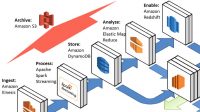organizations are constantly seeking efficient and scalable solutions to handle vast amounts of data. AWS (Amazon Web Services) offers a comprehensive suite of tools and services for big data processing and analytics. This article explores the advantages and disadvantages of AWS Big Data, shedding light on the benefits it brings as well as the potential challenges that may arise.
Cost-Effectiveness
AWS Big Data offers a cost-effective solution for processing and analyzing large volumes of data. The pay-as-you-go pricing model allows organizations to scale their resources up or down based on their specific needs, eliminating the need for upfront infrastructure investments.
Scalability
One of the key advantages of AWS Big Data is its scalability. With AWS, organizations can easily scale their data processing and storage resources to handle growing data volumes without any significant infrastructure modifications. This flexibility ensures that businesses can meet their ever-increasing data demands.
Flexibility
AWS provides a wide range of tools and services for big data processing, such as Amazon EMR (Elastic MapReduce), Amazon Redshift, and Amazon Athena. This flexibility allows organizations to choose the most suitable tools based on their specific requirements, ensuring optimal performance and efficiency.
Integration
AWS Big Data seamlessly integrates with other AWS services, making it easy to connect and transfer data between different systems. This integration simplifies the data pipeline and enables organizations to leverage the full potential of their data across various applications and services.
Security
AWS has robust security measures in place to protect data stored and processed within its infrastructure. With AWS Big Data, organizations can implement fine-grained access controls, encryption mechanisms, and compliance frameworks to ensure data security and meet industry-specific requirements.
Learning Curve
While AWS offers powerful tools for big data processing, there is a learning curve involved in mastering these technologies. Organizations need to invest time and resources in training their teams or hiring skilled professionals who are proficient in AWS Big Data technologies.
Reliance on Internet Connectivity
Using AWS Big Data requires a stable internet connection since data processing and analysis typically occur in the cloud. Organizations operating in remote areas with limited internet connectivity may face challenges in leveraging the full capabilities of AWS Big Data.
Data Transfer Costs
When using AWS Big Data, organizations need to consider the costs associated with data transfers. Uploading and downloading large volumes of data to and from AWS can result in additional expenses, especially if data needs to be transferred frequently.
Complexity
Managing and configuring AWS Big Data infrastructure can be complex, particularly for organizations without prior experience in cloud-based big data solutions. It requires careful planning, architecture design, and ongoing maintenance to ensure optimal performance and cost efficiency.
Vendor Lock-In
Adopting AWS Big Data may lead to vendor lock-in, where organizations become heavily reliant on AWS services and find it challenging to migrate to alternative platforms. It is crucial to carefully evaluate the long-term implications of vendor lock-in and have contingency plans in place.
Performance
AWS Big Data offers excellent performance for processing and analyzing large datasets. However, the actual performance can vary depending on various factors, including the specific AWS services used, data volume, and configuration settings. Organizations must optimize their setups to achieve the desired performance levels.
Compliance
For organizations operating in highly regulated industries, compliance with data privacy and security regulations is paramount. AWS offers various compliance certifications and provides tools to help organizations meet their regulatory requirements. However, ensuring compliance may require additional effort and careful configuration.
Community Support
The AWS ecosystem has a vibrant and active community of developers, data scientists, and big data enthusiasts. This community support provides access to a wealth of knowledge, best practices, and troubleshooting resources, making it easier for organizations to overcome challenges and learn from the experiences of others.





